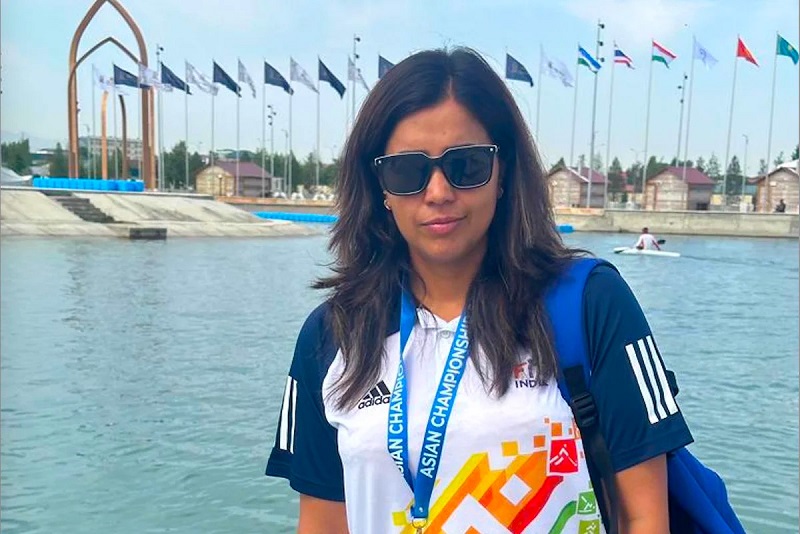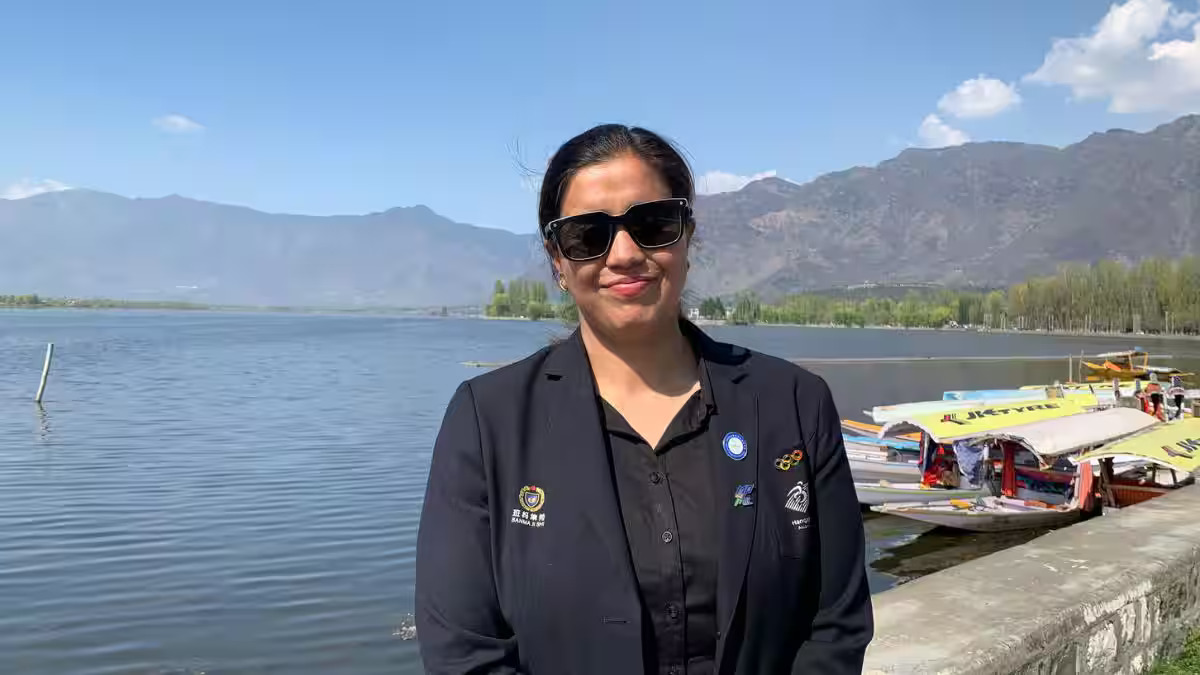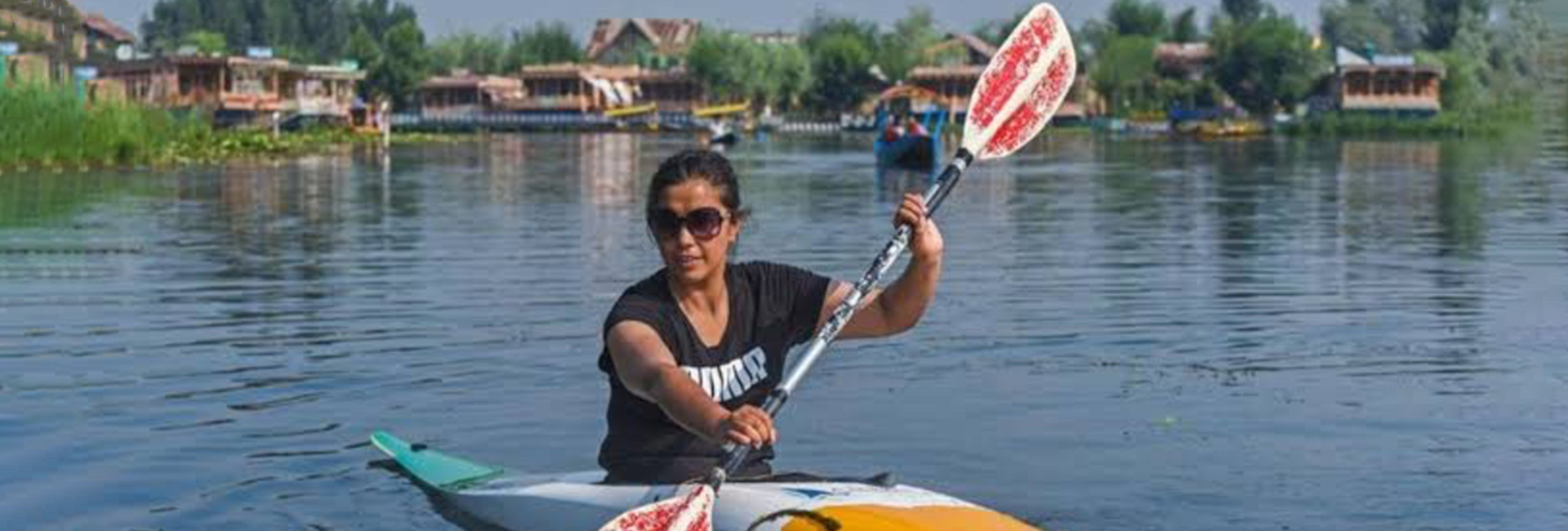(August 2, 2024) Canoeing in the serene waters of the Dal Lake in her hometown of Srinagar, little did the young Bilquis Mir, who had to fight traditions and society, know that someday she will be a jury member at the Olympics. At the Paris Olympics 2024, Bilquis, also popular as the aqua woman of Kashmir Valley, became the first Indian woman on the jury of the prestigious sporting event. It was early this year that she received a letter from the Indian Olympic Association informing her about her appointment as a jury member at the Summer Olympics, and it was a dream come true for the 38-year-old sports promoter. She calls it a moment of pride not just for her but for the country as well.
“I consider it an honour to represent my country as a member of the prestigious jury at the Paris Olympics. I was also a jury member at the Hangzhou Asian Games. This isn’t just a moment of triumph for me but all girls or women who aspire to excel in sports. Only two jury members from Asia has been picked this time (for the Summer Games), with the other being from Japan,” the Global Indian told ANI.

Bilquis Mir
Falling in love with kayaking
But it wasn’t an easy journey for Bilquis. who had to defy a patriarchal society to live her dream. Picking up an unusual sport – kayaking – in a country obsessed with cricket wasn’t easy for this Kashmiri woman. It was serendipity that led Bilquis to kayaking at the Dal Lake. While most girls her age wanted to play kho-kho, she was keen to take up boxing. One day on her way to accompany a friend to boxing practice, she was reprimanded by the coach asking her to either bolt or get in a boat. “Being a Kashmiri girl in a uniform, sitting alone in the park wasn’t okay for me. So, I got in a boat wearing a life jacket but I couldn’t balance the canoe nor did I know how to swim,” she said in an interview. During that hour, she lost count of how many times she fell into the water, and her uniform was soaked. On reaching home, she was scolded by her furious mother. But she was unperturbed as she kept thinking about the feeling of being in a canoe.
The next day after school, she made her way straight to the canoe practice. Taken by the sport completely, she practiced non-stop for three months and even bunked coaching classes to paddle. Her love for the sport turned into a passion when she won her first medal in a local tournament in 1998 with a belief that Nationals was her next stop. But her big dream dashed in a moment as she arrived home to a furious family. “I was beaten up. I believe the struggle of the girl starts from the door of the house. My journey was like that because I had no direction or any role models. Thus convincing my family became difficult. But I conquered all hurdles to reach the pinnacle in my chosen field,” said Bilquis, who found support in her mother.
View this post on Instagram
Fighting the society
She began her training but not without the dismissive looks and grunts of her relatives, especially the men who found it discomforting seeing her in a tracksuit. “Being a Muslim girl, wearing a tracksuit was incredibly difficult and so was staying outdoors in Kashmir, where even boys reconsidered before venturing out,” she said. Treated as an outcast, she received cruel comments from people when she participated in the Nationals and wore an Indian jersey in the 90s. “While I would be treated as an outcast by most people, my parents always understood my interests as well as my potential. They wanted me to be at the top of my game,” Bilquis said in another interview. Her efforts were further marred by the lack of government support, making it even more challenging for her to pursue her interest. In the late 90s, water sports was considered a taboo in Kashmir. “Being a female water sports professional, known or unknown was tough – virtually everyone opposed my choice. People’s criticisms made me hang up my boots for a while.” Bilquis even considered quitting but it was her mom who encouraged her to keep going. “She told me, ‘you have to continue your passion. At this point of time, if you succumb to social pressures, it won’t be only you who will lose, but it will be the whole community of future female players like you whose dreams would be shattered’.”
Things took a turn for the athlete when she suffered a hip and shoulder injury during training and was asked to coach the junior boys’ team at the age of 25. “My country needed a coach and I was happy to step up. To achieve this, I became the first Indian woman to study coaching at the prestigious Semmelweis University in Budapest.” She graduated with Grade A, and was soon appointed as the national coach of canoeing and kayaking in 2007, a rare feat for a Kashmiri woman.

Bilquis Mir
Breaking the norms
After guiding the team to the Nationals, Asian Games, World Championship, and Olympics, Mir felt a deep yearning to go back to Kashmir and help develop young athletes. Since her return, her coaching has led to Kashmir winning 110 medals in the last four years. “When I was young, I often heard that girls can’t pursue adventure sports. People used to make fun of me thinking I wouldn’t be able to do anything. I am proud to say that 50% of J&K’s athletes are women and they are doing very well,” she said.
Now, she has made history as the first Indian woman to join the jury for the Paris Olympics. Despite facing challenges, including a lack of government support and societal expectations, she pursued her passion for sports with determination and resilience. From her early days of struggling to balance a canoe to coaching athletes on the international stage, Mir has broken barriers and set new standards. Her achievements not only reflect her personal success but also symbolize the potential of women in sports, inspiring a new generation of athletes in Kashmir and beyond. Through her unwavering dedication, Mir has shown that with perseverance and courage, one can overcome any obstacle to achieve greatness.
- Follow Bilquis Mir on X




